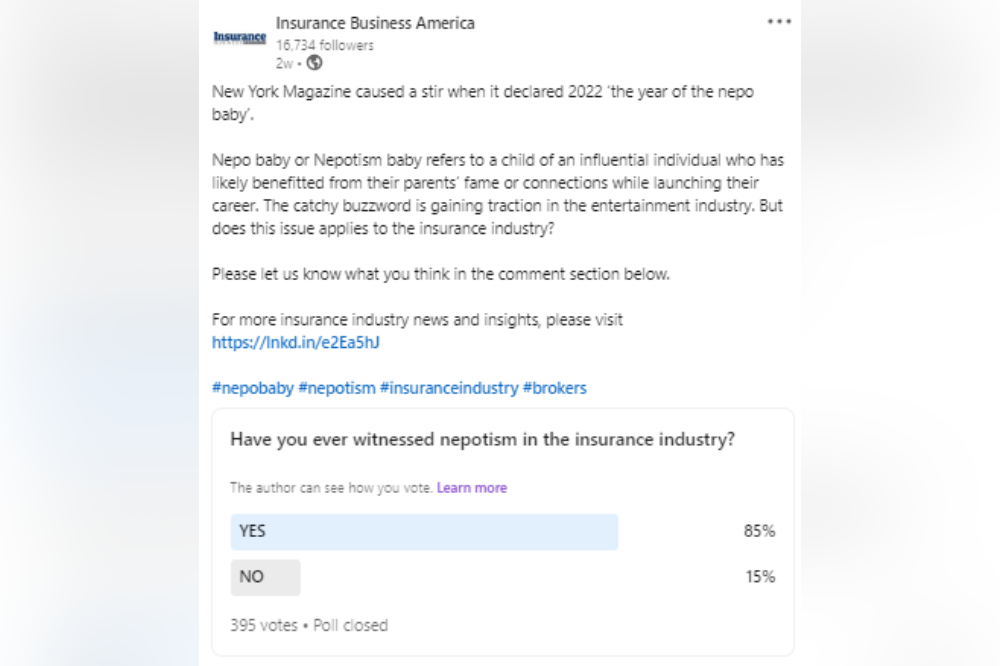Our insurance industry poll showed 85% of 395 voters had seen nepotism at some point in their career. Survey takers took part from the US (58%), Canada (16%), and the UK (11%), with responses also received from Germany, the Philippines, Australia, and New Zealand.

The result may be damning, if you think of nepotism as a bad thing, but it’s probably not all that surprising.
It’s not a stretch to think of examples of insurance family dynasties – big names might include your Gallaghers or your Greenbergs – and it’s not uncommon to come across senior leaders whose parents also worked in the industry.
The same is true at some smaller brokerages, where children might look to go in to the family business.
But is this a negative? And if it is, is nepotism always to blame?
Is nepotism always a bad thing?
‘Nepotism’ can take different forms, and some may be viewed as more disruptive than others. Maybe in one person’s case their parents aided them in getting a job at the bottom, whether within a family business or elsewhere, whereas another person may have leapt into a coveted position.
Sometimes the best person for the job might be someone who has built up an understanding of insurance because they grew up around it.
Some might argue that the offspring of established insurance leaders come with some kind of ‘genetic pedigree’ – their parents are successful, and this, in turn, means they could well be a good bet too. It’s also easier to know if the child of someone already at your organisation, or someone you know personally, is likely to be a quality cultural fit.
Hopefully most of us don’t know too many parents who don’t want the best for their kid, and that too lies at the heart of this.
Being the child of someone of renown likely comes with its own set of challenges and expectations, as Lily Allen (daughter of actor Keith Allen and sister of Game of Thrones actor Alfie Allen) and others have flagged.
“The nepo babies y’all should be worrying about are the ones working for legal firms, the ones working for banks, and the ones working in politics, if we’re talking about real world consequences and robbing people of opportunity,” Allen said in a series of nepotism-related tweets following the New York Magazine cover.
“But that’s none of my business.”
The nepo babies y’all should be worrying about are the ones working for legal firms,the ones working for banks,and the ones working in politics, If we’re talking about real world consequences and robbing people of opportunity. BUT that’s none of my business.
— Lily A (@lilyallen) December 19, 2022
And she may have a point.
Showbusiness might forever remain one of those near-impossible-to-crack industries for most people, but financial services ought to be a very different beast. And nepotism could, at times, pose a very real obstacle for talented people who aren’t born with connections and already face hiring barriers. This could have further-reaching consequences.
Perceived nepotism can be an open ‘secret’
In the drive towards growth and profitability, aided by diversity of thought, businesses should be looking for the best person for the job. Giving the boss’s child, or an inexperienced pal, a helping hand cannot come at the expense of this.
Even if employees aren’t directly raising questions or expressing dissatisfaction due to perceived nepotism, you can be sure that being seen to practice it (or at least being seen to do it badly) runs the risk of leaving staff feel undervalued.
You might even think that nepotism slides under the radar – but anonymous employee gripes on layoff tracker and job review sites (plus our poll results) demonstrate that this is not always the case.
Whether it’s the CEO’s son who’s suddenly jumped a couple of rungs in the business or the child of a well-connected insurance leader who’s seen to have slid into top jobs and now wields the corporate axe, in this hybrid age family connections make for the internet’s water cooler gossip.
I’m a firm believer that we should all (including any insurance ‘nepo babies’ out there) be judged and rewarded based on our own individual merits and performances – and there are plenty of success stories where later generations of insurance families have built on or even eclipsed their parents’ legacy. There are also examples of individuals who have made waves from much humbler beginnings, including some ‘dynasty’ starters.
However, I’m also reminded of fictional long-suffering media baron Logan Roy (of the TV show Succession, oft said to be loosely based on the Murdoch family) who surrounds himself with his children, furnishes them with high flying positions, and yet doesn’t seem to have a good word to say about any of them. He certainly doesn’t appear to trust them to take the reins – and watching their hijinks, you can see why.
If companies are seen to engage in nepotism and the benefitting individuals flounder, this could have adverse consequences for staff morale, the talent pipeline, and the firm’s performance.
One might even call nepotism a risky business.
Do you think insurance has a nepotism problem? Perhaps you’re an insurance ‘nepo baby’? We’d love to hear from you in the comments below.
#Editorial #insurance #nepotism #problem





